Guest blogged by Jon Ponder, Pensito Review.
On Tuesday, Stephen Hayes, a conservative columnist and analyst for CNN, revealed that George Bush and Karl Rove have launched a new propaganda campaign with the monumental goal of rewriting the history of the past eight years. The newspeak title of the enterprise is the "Bush legacy project."
The campaign rolled out this week, first in an "exit interview" Bush gave Charlie Gibson of ABC News and then in an Oxford-style debate in Manhattan in which Rove argued against the proposition that "Bush 43 Is the Worst President of the Last 50 Years." In the separate venues, both men attempted to reposition Bush's role in the invasion of Iraq from resolute war president, as he depicted himself at the time, to a reluctant warrior who was misled by bad intelligence into making what many analysts rate as the worst military decision in U.S. history.
The BRAD BLOG commented previously on the newly retreaded myth of "bad" pre-war intel, and how it's now being used to prop up both Bush's and the mainstream corporate media's tragic legacy of failure which led to the deaths of hundreds of thousands of U.S. troops and innocent Iraqi civilians.
Bush was up first, on Monday night, with the interview with ABC's Gibson, but notice how Bush whiffs on the revisionist script when he is supposed to second-guess the decision to invade:
(This snippet starts at 1:10 in the video above.)
GEORGE BUSH: I don't know --- the biggest regret of all the presidency has to have been the intelligence failure in Iraq. A lot of people put their reputations on the line and said the weapons of mass destruction is a reason to remove Saddam Hussein. It wasn't just people in my administration; a lot of members in Congress, prior to my arrival in Washington D.C., during the debate on Iraq, a lot of leaders of nations around the world were all looking at the same intelligence. And, you know, that's not a do-over, but I wish the intelligence had been different, I guess.
GIBSON: If the intelligence had been right, would there have been an Iraq war?
BUSH: Yes, because Saddam Hussein was unwilling to let the inspectors go in to determine whether or not the U.N. resolutions were being upheld. In other words, if he had had weapons of mass destruction, would there have been a war? Absolutely.
GIBSON: No, if you had known he didn't.
BUSH: Oh, I see what you're saying. You know, that's an interesting question. That is a do-over that I can't do. It's hard for me to speculate.
There he is caught in amber: Bush, the pathological dissembler, as presented by Mark Crispin Miller in his brilliant book published in 2002, The Bush Dyslexicon. When Gibson asks the money question --- "If the intelligence had been right, would there have been an Iraq war?" Bush responds with a falsehood he's told so many times that it is now too-often taken as the truth. "Yes," Bush says brightly, "because Saddam Hussein was unwilling to let the inspectors go in to determine whether or not the U.N. resolutions were being upheld."
In reality, Saddam Hussein allowed International Atomic Energy Agency (IAEA) inspectors into Iraq in December 2002, four months before the war began. The inspectors destroyed Iraq's remaining stockpiles of al Samoud missiles in early 2003, a move that independent analysts saw as a serious effort by Saddam to disarm in order to avoid war. On March 7, Hans Blix, the head of the IEAE inspection team, told the UN that "at this juncture we are able to perform professional, no-notice inspections all over Iraq and to increase aerial surveys." Immediately after Blix' report, however, Bush warned the inspectors to prepare to leave Iraq. Ten days later, he ordered them out of the country. The invasion began three days later, on March 20.
Of course, Gibson makes no effort to challenge Bush on these facts, in part because Bush immediately changes the subject, commandeering the interview by asking himself a question he'd prefer to answer: "In other words," Bush says, by way of introducing his self-interrogatory, "if [Saddam] had had weapons of mass destruction, would there have been a war? Absolutely."
But when Gibson asks the correct question a second time, Bush responds with utter guile, "Oh, I see what you're saying," and then dismisses it with, "That is a do-over that I can't do" [because it would mean admitting I was wrong]. He finally shuffles away from the subject, muttering, "It's hard for me to speculate," even though he'd been speculatin' quite easily five seconds earlier when he wished "the intelligence had been different, I guess."
In the debate in Manhattan the next night (PDF transcript), Karl Rove sticks to the revisionist script:
KARL ROVE: No. In the aftermath of 9/11 the concern was about a tyrant guilty of enormous human rights abuses, but possessed with weapons of mass destruction and an intention to use them as a state sponsor of terror. Absent that, I suspect the administration’s course would have been to work to find more creative ways to constrain him than he’d been constrained in the 1990s. The president did have an enormous concern about the human rights abuses under Saddam Hussein. He also had a concern about the deterioration of the credibility of the United Nations, which had passed sixteen resolutions calling upon him to abide by the outcome and the agreements that he made in the aftermath of the ’91, of the first Gulf War, that he’d not lived up to. But absent weapons of mass destruction, no, I don’t think there would have been an invasion.
The newly revised version of Bush's role in ordering the invasion stands in stark contrast with what Bush told Brit Hume of Fox "News" two years ago this month:
BUSH: I said it today, and I said it at the last speech I gave. And I've said it throughout the [2004 presidential] campaign to the American people. I said I made the right decision. Knowing what I know today, I would have still made that decision.
HUME: Now if you had this --- if the weapons had been out of the equation, because the intelligence did not conclude that he had them, it was still the right call?
BUSH: Absolutely.
In fact, there were indications a year prior the invasion that Bush was already "absolutely" determined to invade Iraq at all costs, and that the intelligence on Iraq's weapons was being rewritten to support this objective. According to the Downing Street Memo (DSM), a secret document prepared for the British government by their security officials in Washington, in the spring of 2002, "Bush wanted to remove Saddam, through military action, justified by the conjunction of terrorism and WMD. But the intelligence and facts were being fixed around the policy."
Bush's long-standing determination to invade Iraq has been confirmed by former Bush staffers, including Treasury Secretary Paul O'Neill, national security team member Richard Clarke and, most recently, Press Secretary Scott McClellan.
The rollout of the legacy project this week is likely a preview of what's to come as Bush, Rove and the other dead-enders spend the rest of his retirement years falsifying and re-arguing Bush's record until the truth is upended and facts are blurred beyond recognition.
Unfortunately, this strategy is likely to work. American memories are famously short, for one thing, and, for another, propagandizing is something Bush actually does well. But mainly Bush will succeed in reframing his presidency because no serious efforts are in the works to investigate, much less litigate, his record of misdeeds and misjudgments.
With no official investigative findings or verdict hanging over his head, and using his $500 million "freedom institute" in Dallas as a platform, Bush is free to spend the rest of his life reinventing his record and recasting his role in its disasters as Victim-in-Chief. In fact, the only thing that stands in the way of the Bush legacy project is the same force that hobbled his administration in its second term: the legions of ever-vigilant truth-squadders out there, armed with the facts.


 Sunday 'Close Enough' Toons
Sunday 'Close Enough' Toons A Pretty Weak 'Strongman': 'BradCast' 10/30/25
A Pretty Weak 'Strongman': 'BradCast' 10/30/25 'Green News Report' 10/30/25
'Green News Report' 10/30/25
 Proposal for 'First Politically Viable Wealth Tax' Takes Shape in CA: 'BradCast' 10/29/25
Proposal for 'First Politically Viable Wealth Tax' Takes Shape in CA: 'BradCast' 10/29/25 Monster Storm, Endless Wars, Gamed Elections:
Monster Storm, Endless Wars, Gamed Elections: 'Green News Report' 10/28/25
'Green News Report' 10/28/25 Let's Play 'Who Wants
Let's Play 'Who Wants Sunday 'Cartoonists Dilemma' Toons
Sunday 'Cartoonists Dilemma' Toons Exiled NOAA Scientists Resurrect Critical Disaster Database: 'BradCast' 10/23/25
Exiled NOAA Scientists Resurrect Critical Disaster Database: 'BradCast' 10/23/25  'Green News Report' 10/23/25
'Green News Report' 10/23/25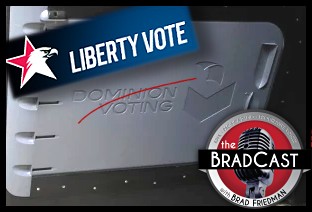 Trump-Allied GOP Partisan Buys Dominion Voting Systems: 'BradCast' 10/22/25
Trump-Allied GOP Partisan Buys Dominion Voting Systems: 'BradCast' 10/22/25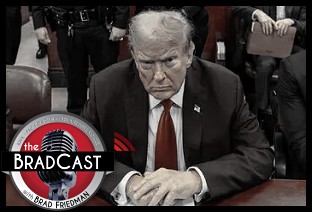 Trump, Republican Law(lessness) & (Dis)Order: 'BradCast' 10/21/25
Trump, Republican Law(lessness) & (Dis)Order: 'BradCast' 10/21/25 'Green News Report' 10/21/25
'Green News Report' 10/21/25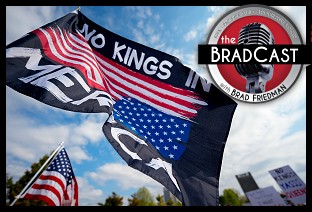 Celebrating 'No Kings': 'BradCast' 10/20/25
Celebrating 'No Kings': 'BradCast' 10/20/25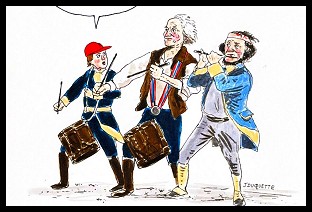 Sunday 'How It Started' Toons
Sunday 'How It Started' Toons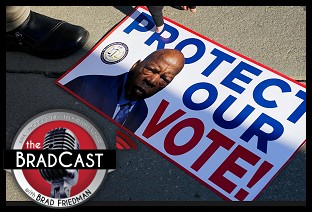 SCOTUS Repubs Appear Ready to Gut Rest of Voting Rights Act: 'BradCast' 10/16/25
SCOTUS Repubs Appear Ready to Gut Rest of Voting Rights Act: 'BradCast' 10/16/25 'Green News Report' 10/16/25
'Green News Report' 10/16/25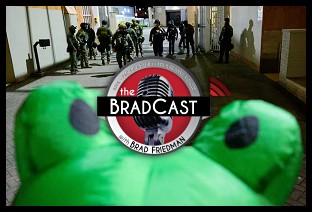 The 'Epstein Shutdown' and Other Autocratic Nightmares: 'BradCast' 10/15/25
The 'Epstein Shutdown' and Other Autocratic Nightmares: 'BradCast' 10/15/25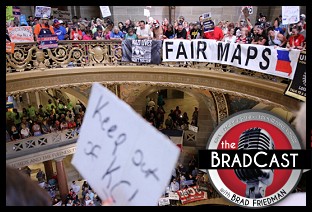 Group Vows to Block MO's GOP U.S. House Gerrymander: 'BradCast' 10/14/25
Group Vows to Block MO's GOP U.S. House Gerrymander: 'BradCast' 10/14/25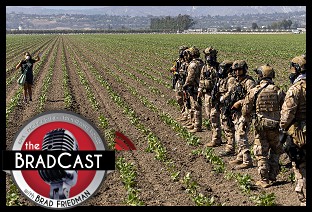 Trump Labor Dept. Warns Trump Policies Sparking Food Crisis: 'BradCast' 10/9/25
Trump Labor Dept. Warns Trump Policies Sparking Food Crisis: 'BradCast' 10/9/25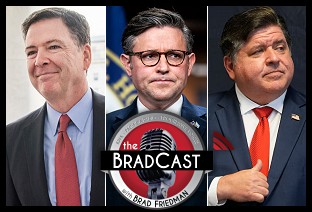 Trump's Losing Battles: 'BradCast' 10/8/25
Trump's Losing Battles: 'BradCast' 10/8/25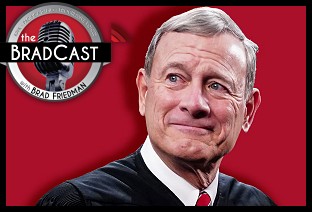 Trump, Roberts and His Stacked, Packed and Captured SCOTUS: 'BradCast' 10/7/25
Trump, Roberts and His Stacked, Packed and Captured SCOTUS: 'BradCast' 10/7/25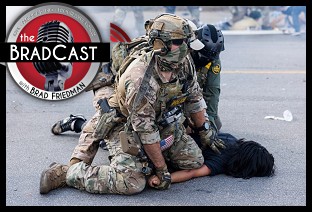 Trump Attempting His 'Invasion from Within': 'BradCast' 10/6/25
Trump Attempting His 'Invasion from Within': 'BradCast' 10/6/25 Biden Budget Expert: Mass Firings in Shutdown 'Illegal': 'BradCast' 10/2/25
Biden Budget Expert: Mass Firings in Shutdown 'Illegal': 'BradCast' 10/2/25 Why is DOJ Suing 'Blue' States for Their Voter Databases?: 'BradCast' 10/1/25
Why is DOJ Suing 'Blue' States for Their Voter Databases?: 'BradCast' 10/1/25
 VA GOP VOTER REG FRAUDSTER OFF HOOK
VA GOP VOTER REG FRAUDSTER OFF HOOK Criminal GOP Voter Registration Fraud Probe Expanding in VA
Criminal GOP Voter Registration Fraud Probe Expanding in VA DOJ PROBE SOUGHT AFTER VA ARREST
DOJ PROBE SOUGHT AFTER VA ARREST Arrest in VA: GOP Voter Reg Scandal Widens
Arrest in VA: GOP Voter Reg Scandal Widens ALL TOGETHER: ROVE, SPROUL, KOCHS, RNC
ALL TOGETHER: ROVE, SPROUL, KOCHS, RNC LATimes: RNC's 'Fired' Sproul Working for Repubs in 'as Many as 30 States'
LATimes: RNC's 'Fired' Sproul Working for Repubs in 'as Many as 30 States' 'Fired' Sproul Group 'Cloned', Still Working for Republicans in At Least 10 States
'Fired' Sproul Group 'Cloned', Still Working for Republicans in At Least 10 States FINALLY: FOX ON GOP REG FRAUD SCANDAL
FINALLY: FOX ON GOP REG FRAUD SCANDAL COLORADO FOLLOWS FLORIDA WITH GOP CRIMINAL INVESTIGATION
COLORADO FOLLOWS FLORIDA WITH GOP CRIMINAL INVESTIGATION CRIMINAL PROBE LAUNCHED INTO GOP VOTER REGISTRATION FRAUD SCANDAL IN FL
CRIMINAL PROBE LAUNCHED INTO GOP VOTER REGISTRATION FRAUD SCANDAL IN FL Brad Breaks PA Photo ID & GOP Registration Fraud Scandal News on Hartmann TV
Brad Breaks PA Photo ID & GOP Registration Fraud Scandal News on Hartmann TV  CAUGHT ON TAPE: COORDINATED NATIONWIDE GOP VOTER REG SCAM
CAUGHT ON TAPE: COORDINATED NATIONWIDE GOP VOTER REG SCAM CRIMINAL ELECTION FRAUD COMPLAINT FILED AGAINST GOP 'FRAUD' FIRM
CRIMINAL ELECTION FRAUD COMPLAINT FILED AGAINST GOP 'FRAUD' FIRM RICK SCOTT GETS ROLLED IN GOP REGISTRATION FRAUD SCANDAL
RICK SCOTT GETS ROLLED IN GOP REGISTRATION FRAUD SCANDAL VIDEO: Brad Breaks GOP Reg Fraud Scandal on Hartmann TV
VIDEO: Brad Breaks GOP Reg Fraud Scandal on Hartmann TV RNC FIRES NATIONAL VOTER REGISTRATION FIRM FOR FRAUD
RNC FIRES NATIONAL VOTER REGISTRATION FIRM FOR FRAUD EXCLUSIVE: Intvw w/ FL Official Who First Discovered GOP Reg Fraud
EXCLUSIVE: Intvw w/ FL Official Who First Discovered GOP Reg Fraud GOP REGISTRATION FRAUD FOUND IN FL
GOP REGISTRATION FRAUD FOUND IN FL

































